I’m on a ferry returning to Busan from a weekend exploring Yokji Island, and I feel like I’ve been here before. I guess I have.
Sick of the smell, the noise, the lights, the people, the hustle and bustle of Busan, I was looking to get away from the city for the weekend, to spend some time in nature.
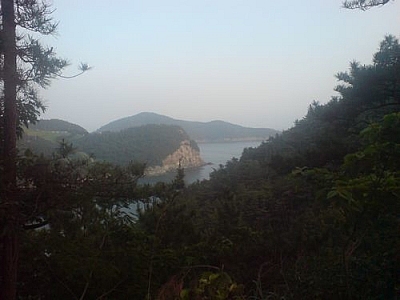
So I made my way to Tongyeong early Saturday morning and hopped on a ferry, ready to start exploring Yokji Island.
Yokji Island, or Yokjido, wasn’t exactly a place I wanted to cross off my list or anything. I just went to the ferry terminal, looked at the schedule and some island maps, and chose a ferry that was departing soon.
I wasn’t picky about where I was going to relax because I knew that no matter what, it would be beautiful since I was heading into national marine park waters.
Hiking To a Campsite While Exploring Yokji Island
When I disembarked, I consulted a crude map and got out of the village as fast as I could. I would set up my tent in the first decent place I saw.
I intended to hike around, camp, relax, and nothing else. I don’t know why I assumed it would be easy to find a campsite while exploring Yokji Island…
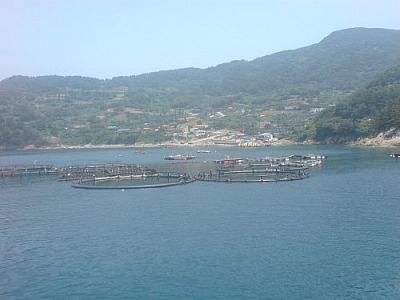
Two hours later, I hadn’t seen a good spot yet. Having hiked to another village by then, I was thirsty and sunburned.
I stopped at a minbak (private home with rooms for rent) to ask about camping.
Before answering my questions, the ajuma, all without a word of English, made me remove my backpack and sit down, gave me water and a banana, then covered my sunburned shoulders with wet cloths.
Then she fetched her husband.
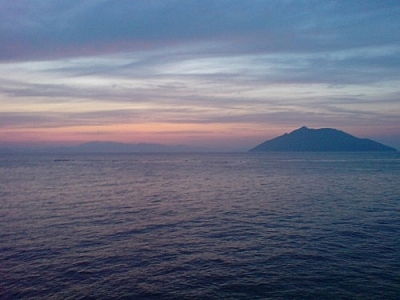
“So you want to go camping?” I was surprised but grateful that he spoke English. “Follow me, I’ll show you the beach.”
Now armed with a better map of the island and the bus schedule, I decided the rocky beach was unsuitable.
“How about over there, across the bay?”
Mr. Kang told me how to get there, then excused himself to go work on his fishing boat.
I had been attracted to the spot from a distance because a ship was landed there, abandoned. It looked like a good camping spot, large and flat, and I thought the small fishing village would make a good base for exlporing Yokji Island.
Fifteen minutes later, I decided that it would have to do.
There’s no getting away from junkyards in Korea, and the island was too mountainous and rocky for camping. I had a great view of the ocean before me and lush forest behind me. The trash heaps, relatively small, could reasonably be ignored.
Histories and Legends of Yokji Island
The next day, night-time having been uneventful, I worked on Memories of a Carnivore and studied Korean.
I could have left, gone back to Busan, but I reasoned that another tranquil night was just what I needed. I could go back to the real world on Monday morning.
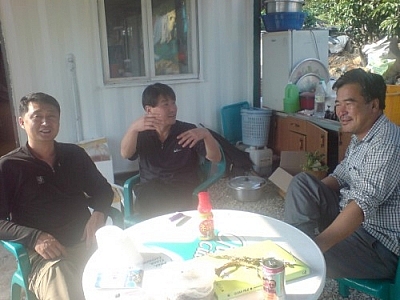
That afternoon, I went to visit the Kangs. I talked for hours with Mr. Kang, occasionally to his wife and guests with him as the interpreter.
He told me about his family history, about how 150 years ago, his great-grandmother came to the island on a rowboat with her children (her husband having passed away), a journey which took two days.
Mr. Kang told me one of the island’s legends, about a group of men who once tried to find the hole in the mountain where the dragon slept.
He answered all of my questions, whether more general (population, wildlife, religion, tourism, education) or more specific. How did that boat get on land? Why are those houses next to it abandoned?
Mr. Kang was the perfect host. He’d been a seafarer for twenty years and had travelled all over the world. He knew how to talk to people.
Sometime in the middle of our conversation, a vision struck me. It was Reverse Tourism reversed. Mr. Kang was my father and I was Anne. I remembered the words I’d written months ago, so recently published: “the impact I have on those I meet on the road to discovery, the unsuspecting tour guides of the world.”
I left the Kang family feeling validated somehow.
Camping Plan B For Exploring Yokji Island
I went back to my tent and called it a night rather early.
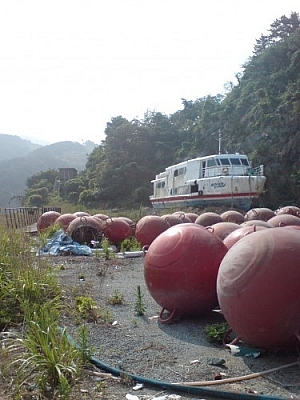
I’d been in bed about an hour, not really sleeping but not quite awake either, when the wind rose considerably. At first I was afraid, but the pegs seemed to be holding, so I tried to sleep some more.
But the wind started raging and I just couldn’t. I wondered if this was a test of my tenacity and endurance, or if I should just wuss out and pack up.
Ping! Ping!
Well, that settled it. At least one peg had come out.
I hurriedly packed up my things. I was nearly done by the time one side of the tent collapsed. The other side followed quickly and I had to grope about the folds of the tent to find the door.
Throwing my things outside ahead of me, I crawled out, dismantled the poles and gathered the pegs, shouldered my pack and bundled the tent, and made my way to the abandoned houses on the other side of the ship. I’d explored them the day before so I had a clear idea of what I was going to do.
Once there, I checked out the bed. Dusty, a few dead bugs, some old mouse droppings, nothing worse.
I shook out the folded comforter, but nothing alarming fell out, so I laid it over the bare mattress. I turned the pillows over, hoping there would be less dust on that side. I made sure that all parts of my body were covered by my clothes, even putting my hands inside the sleeves of my hoodie, then wrapped myself in my own tiny blanket (which had been inadequate the night before), finally laying down to sleep.
I couldn’t help but feel I’d done this before. Laying there, I remembered a great childhood adventure.
Under ten years old still, and excited, I wasn’t too concerned when the waves on Lake Nipissing started getting bigger and our mother told us to help her keep the cupboard doors shut. Our family had owned a houseboat for as long as I could remember — we knew what to do.
My father’s lifelong best friend and his family were with us, as they often were. Soon, despite our combined best efforts, we were all being thrown around, unable to keep the doors closed, and plastic plates and cups started to fall out.
My father steered towards a sheltered bay and found a place to beach the houseboat, near an empty hunting camp. Breaking the lock, we entered and took refuge, digging out sleeping bags and blankets, and some canned goods (the adults left money in a drawer, my mother later told me).
Conclusion
So, now I’m on the ferry, heading back to reality. But, reality hasn’t caught up with me just yet. I’m lying on a pile of huge flotation cushions, remembering what it felt like to travel on the houseboat, feeling relaxed yet still not ready to return to the city.
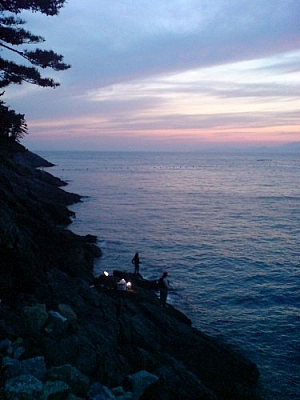
Still, I’ve relived a lot of my life this weekend. Maybe I’m tired. Maybe reality’s just what I need.




Search Niackery
×